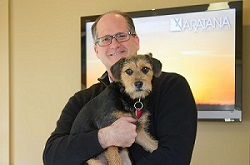With shares having fallen from a 52-week high of $20.63 to $7, it was a tough time for Aratana Therapeutics ($PETX) executives to be holding an investor day. But they powered ahead anyway on November 12, presenting a lineup of new brand names and some details on their commercialization strategies to an audience of about 25 investors, who gathered at a midtown hotel ballroom in New York City.
 |
| Aratana CEO Steven St. Peter |
The company is fresh off a big disappointment: On September 25, it announced that its two lymphoma drugs for dogs were not performing as well in a limited rollout as initially hoped, sending the company's share price down nearly 40% in a day. But CEO Dr. Steven St. Peter and his colleagues didn't dwell on the company's cancer franchise, instead choosing to focus on its drugs for stimulating appetite and relieving pain in dogs.
Much of the company's discussion centered around Galliprant (grapiprant), formerly AT-001, a pill to treat pain from osteoarthritis in dogs. Unlike the current market leader, a COX-2 inhibitor from Zoetis ($ZTS) called Rimadyl, Galliprant acts on a different pain receptor and therefore may be less likely to cause dangerous side effects like gastrointestinal bleeding, the company said.
Still, Rimadyl dominates the market, despite the entry of several generics, leading one analyst to ask during a Q&A session whether Aratana will be able to command enough of a price premium and still grab market share. St. Peter and his colleagues declined to talk specifics about pricing, except to say they were actively researching the possibility of being able to charge more for Galliprant because of the safety advantages.
Aratana expects a verdict from the FDA on Galliprant in mid-2016. But it could have two other drugs on the market before that: Entyce (capromorelin), formerly AT-002, to stimulate appetite in dogs, and Nocita (bupivacaine), formerly AT-003, which is a long-acting pain reliever that would be given to dogs postsurgery. The FDA is set to rule on both in February. During the investor day, Aratana estimated the combined market opportunity for the three drugs would exceed $200 million a year.
St. Peter told investors that to truly take advantage of the full market opportunity for the drugs, Aratana would need to get them approved for sale in key overseas markets, particularly in Europe. To accomplish that, the company is actively looking for partners. Aratana is open to considering many types of partnerships, from co-promote deals to equity investments, he said.
A partnership could help provide much-needed capital for Aratana, as well. During the presentation, the company's chief financial officer, Craig Tooman, said the company was pulling back a bit on its R&D spending to conserve cash and that it didn't expect to spend more than $60 million total in 2015 and 2016.
The company downplayed the lymphoma disappointments during the presentation, but in a sit-down interview with FierceAnimalHealth afterward, St. Peter said he was now looking at the two drugs as learning experiences rather than significant commercial opportunities. "Ultimately what we want to do is go back and work on the affinity, the binding, the selectivity--things that will really optimize the products," he said.
Despite the recent Wall Street drubbing, St. Peter has not lost his enthusiasm for the lymphoma market, however. "It's a big opportunity. We believe there's upwards of 100,000 dogs that get diagnosed with lymphoma and treated at some level. It's a several-hundred-million-dollar opportunity, but you've got to add to chemotherapy, and that's the bar."
As for the search for a company to help Aratana break into overseas markets, St. Peter says he's open to many potential scenarios, but he has a very clear idea of what the ideal partnership would look like: It would be similar, he says, to the early Roche ($RHHBY) and Genentech relationship. "It was a geographic split. Genentech stayed very innovative and kept the team intact, and yet Roche had [commercial] rights in Europe and was a great partner," St. Peter says. "We would like to be able to continue to access new products and move them forward quickly, while being partnered with an overseas company that works with us very constructively, as Roche did with Genentech, to help us be successful in the U.S. That would be a really exciting scenario."
- access a webcast of Aratana's investor day here